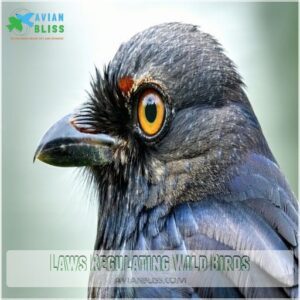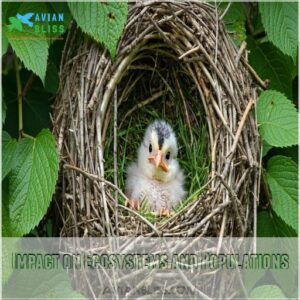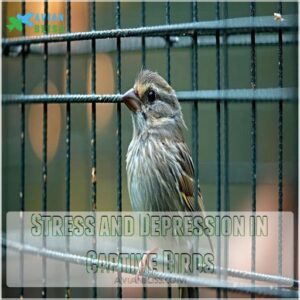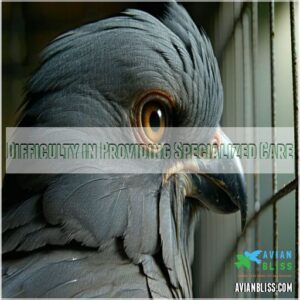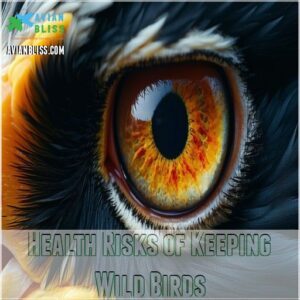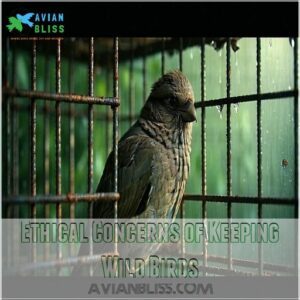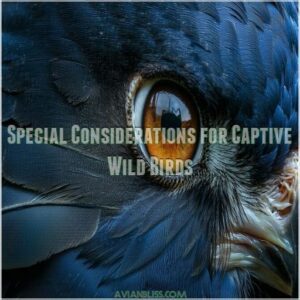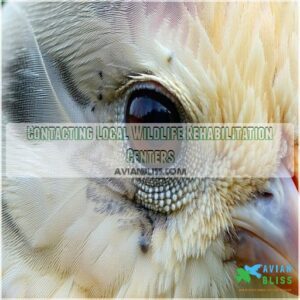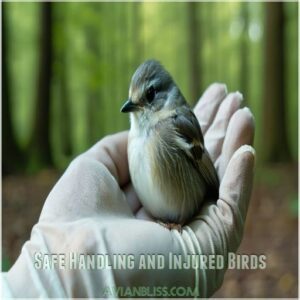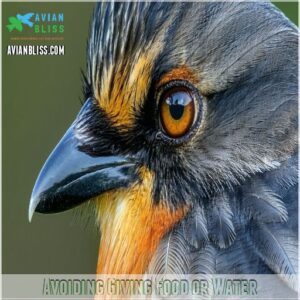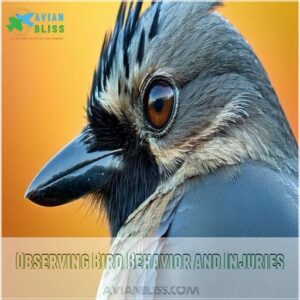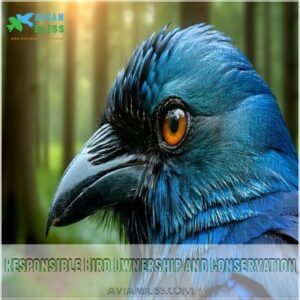This site is supported by our readers. We may earn a commission, at no cost to you, if you purchase through links.
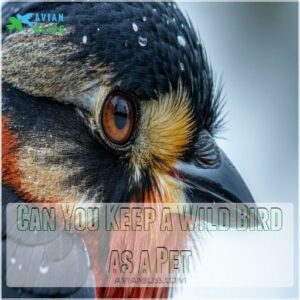
The Migratory Bird Treaty Act protects our feathered friends from capture, with hefty fines and even jail time for violators.
These laws exist because wild birds play essential roles in our ecosystems and simply don’t thrive in captivity.
Instead, you can create magical moments with wild birds by setting up a backyard sanctuary. There’s something special about earning a wild bird’s trust while respecting its freedom to soar.
Table Of Contents
- Key Takeaways
- Laws Regulating Wild Birds
- Can You Keep a Wild Bird as a Pet
- Consequences of Removing Wild Birds
- Health Risks of Keeping Wild Birds
- Ethical Concerns of Keeping Wild Birds
- Special Considerations for Captive Wild Birds
- Alternatives to Keeping Wild Birds
- What to Do if You Find an Injured Wild Bird
- Responsible Bird Ownership and Conservation
- Frequently Asked Questions (FAQs)
- Can you domesticate a wild bird?
- Is it okay to keep a wild bird as a pet?
- Can I keep wild birds?
- Can you keep a bird you find?
- Can you keep a wild bird as a pet?
- Can a parrot be kept as a pet?
- Can You tame a wild bird as a pet?
- Is it illegal to keep a wild bird?
- Is it cruel to keep birds as a pet?
- Can you put a bird in a cage?
- Conclusion
Key Takeaways
- You can’t legally keep wild birds as pets in the United States due to the Migratory Bird Treaty Act, which protects native birds from capture and carries hefty fines and jail time for violations.
- You’ll harm wild birds by keeping them captive, since they suffer from stress, depression, and health issues due to their inability to perform natural behaviors and maintain social bonds.
- You’re putting your health at risk if you keep wild birds, as they can transmit serious diseases like avian flu, psittacosis, and salmonellosis through their droppings, feathers, and direct contact.
- You can connect with wild birds responsibly by setting up backyard feeders, volunteering at wildlife rehabilitation centers, or participating in citizen science projects that support bird conservation.
Laws Regulating Wild Birds
You’ll need to know that keeping native wild birds as pets in the United States is illegal and can result in serious penalties, including hefty fines and potential jail time.
If you’re hoping to share your home with a feathered friend, you’ll want to contemplate legally obtained, captive-bred birds like parakeets or cockatiels instead.
Migratory Bird Treaty Act
Ever wondered about snagging that beautiful wild bird for your home?
Well, the Migratory Bird Treaty Act of 1918 makes that a hard no.
This landmark law protects nearly all native birds in North America from capture, possession, and harassment.
Breaking this act isn’t just frowned upon – it’s a federal crime that can land you with hefty fines and even jail time.
U.S. Fish and Wildlife Services Permits
You’ll need specific permits from the U.S. Fish and Wildlife Service before even thinking about keeping any wild bird.
These permits aren’t easy to get – they come with strict requirements, hefty fees, and regular renewals.
Most applications get rejected unless you’re a licensed wildlife rehabilitator, researcher, or falconer.
Breaking permit rules isn’t just costly; it can land you in serious legal trouble.
Protected Bird Species
Under federal law, nearly every native bird species in North America is protected. From the smallest hummingbird to the mightiest eagle, these fascinating creatures can’t be kept as pets.
Here’s what makes them special:
- Each protected species plays a key role in maintaining nature’s delicate balance
- These birds carry centuries of evolutionary wisdom in their DNA
- Their freedom to soar represents the wild spirit we all cherish
Local Laws and Government Ordinances
While federal laws protect most bird species, keeping a wild bird as a pet often involves understanding the reasons behind irresponsible bird ownership, which can stem from purchasing birds from unethical sources or neglecting proper veterinary care.
Many cities and counties have strict ordinances about interacting with wild birds – even feeding them can be restricted in some areas.
Check with your local wildlife department or animal control office to understand specific rules.
Breaking these ordinances can result in hefty fines or even jail time.
Can You Keep a Wild Bird as a Pet
The allure of keeping a wild bird as a pet is understandable, but here’s the straightforward truth: it’s illegal in the United States.
The Migratory Bird Treaty Act makes it a felony to capture or keep native wild birds, including their feathers, eggs, or nests. There are only a few exceptions, like European Starlings and pigeons, but even these unprotected species raise serious ethical concerns.
If you’re dreaming of bird companionship, consider legal alternatives like adopting captive-bred birds from reputable breeders. These pets come with proper documentation and leg bands indicating their domestic origins.
For those interested in working with wild birds legally, falconry offers a regulated path – though it requires extensive training, permits, and dedication.
Remember, the best way to enjoy wild birds is by watching them thrive in their natural habitat.
Consequences of Removing Wild Birds
You’ll face serious consequences if you remove a wild bird from its natural home, including hefty fines and potential jail time under federal law.
Beyond legal troubles, you’re also disrupting delicate ecosystems and causing unnecessary stress to the bird.
The bird won’t thrive in captivity like a pet store bird would.
Impact on Ecosystems and Populations
Taking a wild bird from its natural home affects more than just that single creature – it creates ripples throughout the entire ecosystem.
Here’s why removing wild birds disrupts nature’s delicate balance:
- Every bird plays a key role in seed dispersal and plant growth
- Missing birds create gaps in the food chain
- Local predators lose their food sources
- Breeding populations shrink, threatening species survival
Think of it like removing a single thread from a tapestry – the whole picture starts to unravel.
Stress and Depression in Captive Birds
When wild birds find themselves caged, they often develop severe psychological distress that can break your heart.
You’ll notice signs like constant pacing, feather plucking, and loss of appetite – clear indicators they’re struggling mentally.
Providing a suitable bird health guide can help identify potential issues, but even with the best intentions, you can’t recreate their natural social bonds and freedom.
It’s like asking a marathon runner to live in a phone booth – it’s simply not what they’re built for.
Difficulty in Providing Specialized Care
Beyond the emotional toll, providing proper medical care for wild birds presents unique challenges.
Finding an avian vet who specializes in wild species can be like searching for a needle in a haystack.
You’ll need to master complex dietary requirements, create specific habitats, and prevent diseases – skills that take wildlife experts years to develop. Even with dedication, meeting these specialized needs often proves overwhelming for well-meaning individuals. specialized needs wildlife experts
Health Risks of Keeping Wild Birds
You’ll need to think twice before bringing a wild bird into your home, as these untamed creatures can carry serious diseases.
Even if you’re tempted by their beauty, wild birds can spread infections.
These infections spread through their droppings, feathers, and direct contact, making them dangerous houseguests. serious diseases put your family’s health at risk.
Diseases Transmissible to Humans
Through direct contact with wild birds, you’re exposing yourself to serious health risks like avian flu, psittacosis, and salmonellosis.
Even their droppings can harbor dangerous bacteria and fungi that cause histoplasmosis and campylobacteriosis.
These diseases spread easily in home environments, putting your entire family at risk. That’s why keeping wild birds as pets isn’t just illegal – it’s potentially dangerous to your health.
Importance of Veterinary Examination
Regular veterinary exams for wild birds require specialized avian vets.
Most avian vets won’t treat wild birds without proper permits.
Wild birds often mask symptoms until they’re critically ill, making preventative care nearly impossible. And unlike domesticated birds, their unique needs and natural defense mechanisms can make early detection of health issues extremely challenging. Even if you find one who will, this makes early detection extremely difficult.
Proper Hygiene Practices
Maintaining spotless hygiene when handling any bird is non-negotiable for your safety and the bird’s well-being.
You’ll need to wash your hands thoroughly before and after contact.
Use designated cleaning tools, and regularly disinfect surfaces and equipment.
Keep separate cleaning supplies for bird areas, and always wear gloves during maintenance tasks.
Consider a mask when deep-cleaning to protect yourself from airborne particles.
Health Risks From Bird Droppings
Bird droppings pose three major health risks: histoplasmosis, cryptococcosis, and psittacosis.
These diseases can spread through dried droppings that become airborne.
You’ll need special protective gear and cleaning protocols to safely handle wild bird waste.
Unlike pet birds that receive regular health screenings, wild birds may carry undetected diseases.
Even brief exposure to contaminated droppings can lead to serious respiratory infections or systemic illnesses.
Ethical Concerns of Keeping Wild Birds
You’ll quickly notice that wild birds in captivity display signs of depression and distress, as they’re cut off from their natural behaviors and social groups.
While you might think you’re helping by giving them a safe home, you’re actually denying these magnificent creatures their fundamental right to live freely in their natural habitat.
wild birds in captivity
Inhumane Treatment of Wild Animals
While addressing health concerns is essential, let’s consider why keeping wild birds captive is fundamentally inhumane.
You wouldn’t want someone to snatch you from your home and family – wild birds feel the same way.
Their natural instincts and behaviors can’t be replicated in captivity.
Here’s what makes wild bird captivity particularly cruel:
- Forced separation from their flock and social structure
- Inability to perform natural foraging behaviors
- Limited flight space prevents natural movement patterns
Caged Wild Birds’ Loneliness and Depression
Imagine being taken from everything you know and love, locked in a space that feels alien and constraining.
This confinement can trigger a natural fear of humans instinct, making their adjustment to captivity even more difficult.
Unlike their domesticated cousins, wild birds in captivity often develop severe depression and loneliness, displaying behaviors like feather plucking, excessive screaming, and self-mutilation.
They’re not just physically confined—their spirits are too, leading to profound psychological distress.
Difficulty in Finding Avian Experts or Veterinarians
Finding qualified avian veterinarians can feel like searching for a needle in a haystack.
Your local area might’ve dozens of pet clinics, but specialists who understand wild birds‘ unique needs are rare gems.
Fortunately, online platforms like emergency vet supplies can provide essential tools and products to help bridge the gap.
Even in major cities, you’ll often need to drive hours to reach an experienced avian vet, and emergency care becomes a serious challenge.
Without access to proper medical expertise, wild birds in captivity face significant health risks.
Public Health Risks From Wild Birds
Wild birds can harbor serious diseases that put your family’s health at risk. Beyond the legal issues of keeping them as pets, these feathered friends might carry infections you’d never expect. Protecting your loved ones means understanding these risks before bringing any bird home.
- Avian flu and West Nile virus could spread through direct contact
- Bird droppings can contain harmful fungi leading to Histoplasmosis
- Close interaction may expose you to Psittacosis, a severe respiratory infection
Special Considerations for Captive Wild Birds
You’ll need to understand the complex needs of captive wild birds, from their specific diets to their unique housing requirements, before you even think about keeping one.
While you might want to help an injured wild bird by taking it home, you’re actually putting both the bird and yourself at risk.
proper care requires special permits, expertise, and facilities that most people don’t have.
Nutrition and Dietary Needs
Every wild bird species has unique dietary requirements that are nearly impossible to replicate in captivity.
For example, understanding their seasonal dietary needs, as explained in this helpful guide on wild bird diets, is essential.
You can’t just toss some birdseed in a dish and call it done.
These birds need specific combinations of insects, seeds, fruits, and nectar that vary by season and species.
Without proper nutrition, they’ll develop serious health issues like metabolic bone disease, vitamin deficiencies, and organ failure.
Housing and Environmental Requirements
You’d need a massive enclosure to house a captive wild bird – we’re talking about recreating their natural habitat in miniature.
Finding appropriately sized large bird cages for sale is just the beginning of the housing requirements that make keeping wild birds both impractical and illegal in most cases.
Temperature control systems must maintain consistent climate zones year-round.
Multiple perches of varying diameters and textures simulate natural branches.
Natural and artificial lighting must mimic seasonal daylight patterns.
Socialization and Behavioral Needs
Birds thrive on meaningful social connections and complex behavioral patterns that mirror their wild counterparts. When kept in captivity, their needs become even more essential to understand and meet.
| Behavior Need | Natural Setting | Captive Setting |
|---|---|---|
| Social Bond | Flock dynamics | Human interaction |
| Activity | Foraging, flying | Enrichment toys |
| Communication | Bird calls | Limited vocalization |
| Territory | Miles of space | Confined area |
Meeting these innate requirements helps prevent stress and depression in captive birds, though it’s challenging to fully replicate their natural social structures.
Alternatives to Keeping Wild Birds
You’ll find amazing ways to connect with wild birds without keeping them as pets, from setting up backyard feeders to joining local bird-watching groups.
If you’re passionate about helping these beautiful creatures, you can also volunteer at wildlife rehabilitation centers or support conservation efforts that protect their natural habitats.
Setting Up Bird Feeders
Setting up a backyard bird feeder creates your own wild bird sanctuary, bringing nature’s beauty right to your window. Instead of keeping wild birds as pets, you’ll experience the joy of watching them thrive in their natural habitat.
- Choose feeders with protective roofs to shield seeds from rain
- Install baffles to deter squirrels and other predators
- Place feeders near natural cover like shrubs
- Clean feeders weekly to prevent disease spread
- Offer a variety of seeds to attract different species
Volunteering at Rehabilitation Centers
After mastering backyard bird feeding, why not take your passion to the next level?
Local wildlife rehabilitation centers welcome volunteers who want hands-on experience with wild birds.
Through specialized training, you’ll learn proper bird handling, feeding techniques, and medical care basics.
It’s incredibly rewarding – nothing beats the feeling of helping an injured bird recover and watching it soar back into the wild.
Supporting Bird Conservation Organizations
Your passion for helping wild birds can soar beyond hands-on volunteering.
Support bird conservation by joining organizations like the National Audubon Society or American Bird Conservancy.
They’re champions for wild birds, fighting habitat loss and climate change through research and advocacy. Your donations fund essential programs that protect endangered species, preserve critical habitats, and promote responsible bird-watching practices. It’s a meaningful way to make a difference. Bird conservation is important.
Participating in Citizen Science Projects
Bird enthusiasts have discovered a rewarding alternative to keeping wild birds as pets – participating in citizen science projects.
These initiatives let you contribute to important research while connecting with nature.
Here are four impactful ways to get involved:
- Track migration patterns using eBird
- Monitor nesting success through NestWatch
- Count backyard birds for Project FeederWatch
- Document urban birds with Celebrate Urban Birds
Educating Others About Wild Bird Protection
Now that you’ve joined citizen science, spreading knowledge about wild bird protection lets you become a true champion for our feathered friends. Share your insights about why wild birds belong in nature, not cages. Here’s a quick guide to help others understand:
| Topic | What to Share | Why It Matters |
|---|---|---|
| Laws | MBTA protects birds | Preserves species |
| Health | Birds need freedom | Prevents suffering |
| Ethics | Support sanctuaries | Builds community |
| Habitat | Create bird gardens | Helps populations |
| Action | Report violations | Guarantees protection |
What to Do if You Find an Injured Wild Bird
If you’ve found an injured wild bird, you’ll need to act quickly but carefully to give it the best chance of survival.
While it’s tempting to try helping the bird yourself, your safest and most effective option is to contact a licensed wildlife rehabilitator.
who’s the proper permits and expertise to care for injured wildlife.
Contacting Local Wildlife Rehabilitation Centers
When you spot an injured wild bird, the first step is finding a licensed wildlife rehabilitation center.
Most states maintain online directories of certified centers, or you’ll find them through your local Audubon Society.
Don’t hesitate to call multiple centers – some specialize in specific species. They’ll guide you through next steps and may send a trained volunteer.
Remember, these centers work tirelessly to help our feathered friends recover and return to the wild.
Safe Handling and Injured Birds
If you spot an injured wild bird, your first instinct might be to scoop it up – but hold that thought.
Always wear thick gloves and approach quietly from behind to minimize stress.
Place a light towel or cloth over the bird, then gently lift it into a ventilated box lined with paper towels.
Keep the box in a warm, dark, quiet place until you can reach a wildlife expert.
Avoiding Giving Food or Water
Your heart might be in the right place, but feeding or giving water to an injured wild bird can do more harm than good.
Even well-intentioned offerings could worsen their condition or spread diseases.
Birds have specialized diets and feeding requirements that vary by species. Instead of reaching for food or water, focus on getting the bird to a licensed wildlife rehabilitator as quickly as possible.
Observing Bird Behavior and Injuries
Before rushing to help, take time to observe the bird’s condition.
Watch for drooping wings, limping, or unusual head positions that signal injury.
Natural behaviors like hopping or short flights suggest less severe problems.
Look for blood, missing feathers, or tangled wings – these need immediate professional attention.
Understanding these signs helps wildlife experts provide the right care when you contact them.
Responsible Bird Ownership and Conservation
While you can’t keep wild birds as pets, you’ll find that responsible bird ownership starts with choosing a captive-bred companion from a reputable breeder.
If you’re ready to welcome a feathered friend into your home, you’ll need to commit to providing proper care, including regular vet checkups and a safe living environment that meets all their needs.
Choosing The Right Bird for You
Selecting a pet bird requires careful consideration of your lifestyle and commitment level.
When browsing different species at reputable breeders, keep these key factors in mind:
- Species personality and noise level
- Expected lifespan (some live 50+ years!)
- Daily interaction requirements
- Financial commitment for food and vet care
- Your living situation and available space
Remember, birds aren’t decorative accessories – they’re intelligent companions needing dedicated care and attention.
Providing a Safe Environment
Creating a safe bird habitat isn’t just about a fancy cage – it’s about crafting a sanctuary that mirrors their natural environment.
You’ll need proper ventilation, appropriate temperature control, and protection from household hazards like fumes and predators.
Enrich their space with natural perches, safe toys, and interactive elements that stimulate their wild instincts.
Remember to position their habitat away from drafts and direct sunlight. This will ensure a safe and healthy environment for your bird.
Regular Veterinary Checkups
Regular checkups with an avian vet are your bird’s ticket to a long, healthy life.
Just like you wouldn’t skip your annual physical, your feathered friend needs routine health screenings to catch potential issues early.
These visits typically include diagnostic tests, weight monitoring, and beak trimming if needed.
While avian vet costs can be higher than regular vets, it’s an essential investment in your bird’s wellbeing.
Avoiding Wild Animals and Insects
While you’re keeping up with your bird’s health checkups, don’t forget about unwanted visitors.
Wild animals and insects can pose serious threats to your pet bird’s well-being, including the spread of air sac mites and feather lice through bird parasite control.
Install predator-proof barriers, use safe pest control methods, and keep feeding areas clean.
Remember, even seemingly harmless wildlife can carry diseases or parasites.
Your bird’s habitat should be a safe haven, not a wildlife hangout.
Frequently Asked Questions (FAQs)
Can you domesticate a wild bird?
Purposely pursuing pet parenthood with wild birds isn’t possible or legal.
You can’t domesticate wild birds, as they’re protected by federal law.
Instead, consider adopting captive-bred birds from reputable breeders for companionship.
Is it okay to keep a wild bird as a pet?
Keeping wild birds as pets is illegal in the United States and harmful to their well-being.
You’ll face legal consequences and hurt these creatures by removing them from their natural habitat.
Consider adopting captive-bred birds instead.
Can I keep wild birds?
No, it’s illegal to keep wild birds in the U.S.
It’s actually a felony.
You’ll face serious legal consequences, and it’s cruel to the birds.
If you want a feathered friend, consider adopting a captive-bred pet bird instead.
Can you keep a bird you find?
You shouldn’t keep a bird you find – it’s illegal and harmful to their wellbeing.
Instead, contact a local wildlife rehabilitator who can provide proper care and eventually release them back into nature.
Can you keep a wild bird as a pet?
Not even a million-dollar mansion could make a wild bird happy in captivity.
It’s illegal in the U.S. to keep native wild birds as pets.
They need their natural habitat to thrive and survive.
Can a parrot be kept as a pet?
Parrots make wonderful companions when obtained from reputable breeders or rescue centers.
They’re intelligent, can live for decades, and bond deeply with their owners.
They’ll need dedicated care, proper housing, and daily interaction.
Can You tame a wild bird as a pet?
A bird in the wild stays wild.
While it’s tempting to befriend these feathered friends, taming wild birds is illegal in the U.S. and harmful to their well-being.
Consider adopting from licensed breeders instead.
Is it illegal to keep a wild bird?
Keeping native wild birds is illegal in the United States – it’s actually a felony offense.
You’ll face serious legal consequences, including potential fines and jail time.
Even possession of feathers or eggs is against federal law. This is a serious offense.
Is it cruel to keep birds as a pet?
A bird’s spirit soars in open skies.
Caged companions can thrive with proper care. It’s not cruel if you provide space, enrichment, and attention to captive-bred pets.
Wild birds deserve their freedom.
Can you put a bird in a cage?
You can safely house captive-bred pet birds in appropriately sized cages that allow movement and enrichment.
However, wild birds shouldn’t be caged as it’s both illegal and harmful to their well-being.
Conclusion
Like a bird soaring freely in the wild, nature’s beauty is best appreciated from a respectful distance.
While you can’t keep a wild bird as a pet, you can create lasting connections through backyard bird sanctuaries, wildlife photography, or volunteering at rehabilitation centers.
By protecting wild birds and their habitats, you’re not just following the law – you’re preserving these magnificent creatures for future generations. Remember, true joy comes from watching wild birds thrive in their natural environment.

